- Home
- Michael Crichton
Grave Descend Page 3
Grave Descend Read online
Page 3
“And they want you to salvage it?”
“I’m not sure,” McGregor said. “Because there’s a big problem with the whole story.”
“What’s that?”
“Wayne is spending a lot of money and effort to hoodwink everybody into believing that the ship went down today, not yesterday.”
“So?”
“Why did he have to explain it all to me? He could have fooled me like the rest of them.”
“Perhaps he wants to be sure you’re ready to go first thing tomorrow,” Sylvie said.
“Perhaps,” McGregor said. “We’re going to fly over. the site later today …”
He paused.
“Is something the matter?”
“No,” he said. “I just wondered whether Wayne wanted me not to be ready first thing today.”
“What are you talking about?”
“I’m not sure,” McGregor said. “Come on.”
In Sylvie’s sports car, it was a short drive along the curving, mountainous road east of Ocho Rios, past all the hotels, and finally into a rugged and relatively undeveloped stretch of coast. As always, McGregor was struck by the beauty of this region; he wondered regretfully how many years it would be before the hotels extended out here.
“Where are we going?” Sylvie said.
“To Silverstone,” McGregor said.
“Whatever for? You’re going to fly over it later today.”
“I know.”
“Then what—”
“It’s a lot of little things,” McGregor said. “Like the fact that Wayne had a map that marked the site of the wreck. He marked it quite exactly. Most people, when locating a wreck, draw a circle, and say, ‘I think it’s somewhere in here.’ Wayne was more definite. He felt certain where it was, and how it lay, and in what depth.”
Sylvie was frowning. “You think he set it up?”
“I don’t know.” McGregor thought about that, but it didn’t make sense. Why should Wayne set it up?
“Then there are other things. Like Miss Grant, who says the ship passed customs in Ocho, and the captain, who says they passed it in Montego.”
“She could be confused.”
“I’m sure she’s confused,” McGregor said. “The question is why.”
“What else bothers you?”
“The course the boat sailed. It was originally moored in Monte Carlo, but it went to Naples for overhaul before the Atlantic crossing.”
“So?”
“From Monte Carlo, a yacht needing an overhaul would most likely go to the harbor in Nice. At most, it would go to Genoa. But why all the way to Naples?”
McGregor took a turn very fast. They were approaching Silverstone now; the road was narrower, less well-paved, with many potholes.
“Then Bimini. Loomis says the ship was listing so he altered ballast in Bimini. It seemed very odd that a boat was trim enough to cross the Atlantic, but not good enough to go from West Palm to Bimini.”
“Maybe ballast was shifted in West Palm.”
“Or else something was taken off the ship—or put on.”
They arrived at Silverstone. It was a high promontory jutting out into the ocean; a white house, secluded in palm trees, was located near the sea; on either side of the promontory were small bays with curved beaches, deserted.
“What do you see?” McGregor said.
“Nothing,” Sylvie said.
McGregor smiled. “No conveniently located native fishermen in quaint little boats that just happen to be large enough to accommodate seven extra passengers?”
“You’re too suspicious,” Sylvie said.
From their vantage point, they could see only the nearest of the two bays; the promontory blocked the farther one.
McGregor drove on down the road, and stopped a second time.
“No,” he said, looking out at the ocean, “I’m not too suspicious.”
There, clearly visible in the midday sun, riding three-quarters of a mile offshore, was the luxury yacht Grave Descend.
5
“IT MAKES NO SENSE,” Sylvie said
“I know.”
He reached into the glove compartment, removed a pair of binoculars and, propping his elbows on the door, peered out at the ship. Riding in the offshore swell, the bow was turned to the ocean. Clearly visible on the stern was the name of the ship in black letters. There could be no mistake.
He swept the binoculars along the profile. “No sign of anyone there.”
“There must be someone,” Sylvie said.
If there were, he would be on the bridge; a skeleton crew always kept a man on the bridge. McGregor peered through the binoculars once more. As the ship rocked gently, the sun glinted off the windows, making it difficult to see in, but after several seconds he was quite sure.
“Nobody there.”
“It’s not possible,” Sylvie said.
But McGregor was already getting out of the car so that he could look back at the house. Silverstone was still obscured by palm trees, but he could get some idea of the size: it was enormous, a mansion looking out on the ocean. From the house, a series of stone steps were cut into the rock, running down the side of the promontory to the beach.
But there was also apparently a pool near the house, for McGregor saw a fat, pale man bounce on the diving board and jump into water with a great splash. He could not see the pool itself because of shrubbery.
He watched longer, hoping for a better glimpse of the pale man. Robert Wayne was not due to fly down until the end of the week. Who could it be? Not Arthur Wayne. He wasn’t fat; the profile was all wrong.
Not a servant, surely.
Then who?
He shrugged. It was probably a friend, or a house-guest. It could be almost anyone; if Robert Wayne could afford a huge yacht, he could also afford to put up a houseguest. Or fifty.
He turned his attention back to the yacht. Sylvie came to stand by his side.
“It is very peculiar,” she said, “that they would hire you to salvage a yacht which is afloat.”
“There’s always a first time.”
“Well,” she said, “at least it will be an easy job.” She paused; he looked over and saw her frowning. “Won’t it?” She gazed over his shoulder and suddenly pointed. “Look!”
He swung his binoculars back to look at Silverstone. Clearly visible was the fat, pale man at the poolside. He was walking toward the edge of the promontory, near where the stairs to the beach began. He seemed relaxed and unconcerned.
McGregor could not see his features clearly, but it was evident he was not a white Jamaican businessman—even the man’s face and neck were pale.
As he watched, the man raised a small box which he was carrying in one hand. He pulled at it in an odd way; for a moment, McGregor did not understand, and then he saw the sun flash on wire.
An antenna.
Radio of some sort. Probably a walkie-talkie.
The man stared toward the yacht. McGregor swung his glasses to look at the boat, but nothing was happening there; it remained, to all appearances, deserted.
Looking back at the fat man, McGregor saw he was not speaking into the box as he had expected. Instead, he seemed to be fiddling with it.
He heard a muffled thud.
Sylvie said: “The yacht!”
Looking back, McGregor saw thin black smoke rising from the stern. The water around the ship churned and boiled, and then was still.
“I’ll be damned …”
There was no further sound. He continued to watch as the Grave Descend sank. It did so slowly and majestically while the man on the promontory watched.
When it had finally disappeared beneath the water, they could still see the swirling and bubbling at the surface, marking where it had gone down.
The man on the promontory watched a few moments longer, then put down the antenna and went back to the house.
“I think this is all very strange,” Sylvie decided.
“I think you’re righ
t,” McGregor said. He got back into the car. “Come on.”
“Where are we going now?”
“It’s where I’m going. You’re going to meet Roger when he brings the stuff.”
“All right. And you?”
“I’m taking a plane trip with Arthur Wayne,” he said, “to look at a sunken yacht.”
The airport at Ocho Rios was built for very small planes and very daring pilots. Boscobel airstrip was only three thousand feet long, and the drop off the end was a great inducement to get up—or down—before you reached the end.
McGregor met Wayne in the small terminal. Wayne pointed to a yellow Piper Cub on the runway. “There she is, ready to go.”
McGregor looked at him; Wayne smiled back. He still wore his three-piece suit, despite the heat, and he had a flushed but heavy air of respectability.
This man is a liar and a crook, McGregor told himself as he looked at Wayne, but he had trouble believing it. If he hadn’t seen the yacht himself …
“Good. Let’s get moving.”
The trouble, McGregor thought, walking across the hot asphalt to the airplane, the trouble was that it was clearly some kind of setup. He was being played for a sucker. The question was what kind of sucker, and why?
He decided it was time for a small experiment. As the engine started with a grunt and a puff of smoke, and the pilot taxied forward along the runway, McGregor said, “I’ve been making arrangements for the dive tomorrow.”
“Good. Everything going well?”
The plane lifted off, climbing high over the ocean, curving in a slow arc east, gaining altitude as it swung.
“Actually, not so well,” McGregor said. “A few snags.”
“Oh?”
He gave a chagrined little smile. “I’m afraid my credit’s not so good, Mr. Wayne. Everybody seems to want a little more.”
“More what?”
“Money,” McGregor said.
Wayne’s eyes, previously smiling and friendly, turned cold. “How much more?”
“Ten thousand dollars.”
“That is not, exactly, a little more.”
“It’s what they want,” McGregor shrugged.
“What who wants?”
“Everybody. The skiff man. My own people. They’re covering themselves, you see. In the past, we’ve worked on private jobs and when we were finished, the owners disappeared.”
“I assure you, Mr. McGregor,” Wayne said, “that we will not disappear.”
“I know that,” McGregor said. “But it’s hard to convince the others.”
Wayne was silent for a long time. Finally he said, “I don’t believe I like you.”
“Well, I’m not in love with you, either.”
“I find your story unconvincing. I think you’re trying—”
“Look, if you don’t like it, get yourself another boy.”
“But there is no time,” Wayne said, “as you are quite aware. We have counted on you.”
“Inside forty-eight hours, you could have divers and equipment flown in from Nassau.”
“That is not the point. The point is that you agreed—we agreed—on an arrangement and you were paid what you felt to be a suitable advance. However,” he said, “I can see that your position might be different now. I will give you a check for five thousand.”
McGregor shook his head. “Ten, or nothing.”
Wayne was silent. After several minutes he nodded.
“Ten thousand it is. But I shall expect a strict accounting at the conclusion of the job.”
“Of course.”
“You will have the check as soon as we land.”
The pilot said, “Silverstone up ahead.”
McGregor peered down as they passed over the house on the promontory. From above, it still appeared huge, and surrounded by a kind of moat of lawn, a swimming pool, a tennis court—all concealed from ground level by a dense ring of palm trees.
They were back over water again. The pilot swung north, moving offshore. McGregor stared down at the water.
“Go as slow as you can,” he said.
“You want to stall?” the pilot asked.
“As slow as you can,” he repeated.
“Okay, okay.”
They were still moving very fast, it seemed. Soon they were a mile out to sea, and he had not seen the ship.
“Go back.”
The Piper Cub tilted, turned, and came back. The shadow skittered over the blue waters. McGregor was looking into the water at the oblique angle that provided the best visibility. He watched as the water turned from green-blue to deep blue, then lighter shades as it became more shallow. They crossed the outer reef. They had missed the ship.
“Around. Go back.”
“Damn,” Wayne said. “It’s here someplace.”
“Be patient,” McGregor said. “If worse comes to worst, we can use an echosounder.”
“Where’ll we get that?”
“Kingston.”
McGregor stared out the window again. He knew that the Grave Descend had gone down farther to the west, but he said nothing. Searching for a sunken ship was supposed to be a long and frustrating business, and it would be best if he made it so.
They continued for another half hour, until the pilot said, “Fuel’s getting down.”
McGregor said, “Try it a little west.”
They did, going out without seeing it. But coming back, as he stared down at the water, he saw the outline of the ship faintly through the blue. It lay at an angle, tipped slightly to port, just beyond the far reef.
“There it is!”
Wayne showed excitement. “Where? Where is it?”
The pilot circled, and they came over it a second time.
“Right,” Wayne nodded, “that’s it.” He produced a Polaroid camera and snapped several pictures. “No question. That’s the Grave Descend.”
“Looks like you were right,” McGregor said. “From the color of the ocean, it’s in sixty to eighty feet.”
Even from this height, he could notice the trails of bubbles which still rose from the wreck. Those trails disappeared eighteen or twenty-four hours after sinking; this ship had obviously been down only a few hours. Even if he had not watched the ship being sunk, he would have been suspicious now.
They must think he was a fool.
“Take it back,” Wayne said to the pilot, and they started their return to the airfield.
McGregor said little on the flight back. He was thinking about what Wayne was up to. Because, though he thought him a fool, he obviously thought him an important enough fool to spend ten thousand dollars on.
For an aging, Jamaica diving bum—McGregor had no illusions about himself—ten thousand dollars was a lot of money. The fact that Wayne had agreed to pay it meant something.
Mostly, it meant that he expected a return on his investment.
What kind of return?
At the airstrip, Wayne wrote out the check and said, “Where are you going now?”
McGregor shrugged. “Make the final arrangements. We’ll dive at eight tomorrow. Do you want to come along?”
“I think that would be a good idea,” Wayne said, nodding.
“Meet us at the main dock at seven forty-five,” McGregor said, and started to walk away.
“There is one other thing …”
McGregor stopped, turned back. “Yes?”
“Where are you staying?”
“I’ve got a little house, east of here, that a friend of mine lets me use when I’m in Ocho.”
“I was thinking,” Wayne said, “that it might be more convenient for everyone if you were in the hotel.”
“It’s not necessary—”
“In fact, I took the liberty of making a reservation in your name. It’s all paid for, of course.”
“Of course.” McGregor suppressed a frown, and said, “I think that’s a very good idea.”
As he walked off, he found himself wondering why Wayne wanted to keep such careful t
rack of him. And that, in turn, made him check behind him as he drove back toward town.
The little white Ford Anglia stuck close, all the way.
6
IT WAS, MCGREGOR RECOGNIZED, a blind prejudice: he didn’t like to be followed. He never had liked it, and he doubted that he’d ever learn. In his rearview mirror on the bike, he watched the Anglia carefully. There was a single person, a native driver.
McGregor stopped for gas, as a little check.
The Anglia pulled off the side of the road a short distance ahead. The driver pretended to look at a map. That was a clumsy gesture, McGregor thought. Anyone born on the island knew it intimately by the time he was old enough to drive.
When his tank was full, he drove on, through the center of town. The Anglia picked up behind him, and let a blue Rover slip between them.
That was not so clumsy. McGregor frowned: perhaps the man knew his business, after all. He drove on to the shantytown near the industrial works, turned left, off the road, onto a muddy rut. He climbed up the hillside, bike grunting and sputtering.
The Anglia followed.
This shantytown was partly deserted, with many of the shacks abandoned. The government was erecting subsidized housing a mile down the road; several of the families had already moved. The town was quiet, with little activity except for an occasional chicken in the road, an occasional bawling child, an occasional woman hanging clothes to dry on a ramshackle front porch.
He pulled onto a smaller muddy road, and finally pulled up before a clearly deserted shack. He parked the bike, and went inside. He went in briskly, but once the door was closed, he stopped and waited.
Old houses in the tropics did not remain empty long. In Jamaica, in years past, they had been taken over by the snakes. But there were no more snakes in Jamaica: centuries before, the plantation owners had imported mongooses from India to deal with the snakes. The mongooses had done their job, and more: with no snakes left, they preyed on chickens and an occasional rat.
So there were no snakes in this house. There might be lizards, but that did not bother him. Mostly, it was the spiders. Like everything else on a tropical island, the spiders grew to a fat, lush size; they were quick to take over old houses, deserted barns, abandoned boats along the shore. Practically none could inject enough venom in a bite to kill a man—unless the man was allergic to the venom, which sometimes happened—but they could make you very sick for a week.

 Dragon Teeth
Dragon Teeth Jurassic Park
Jurassic Park Micro
Micro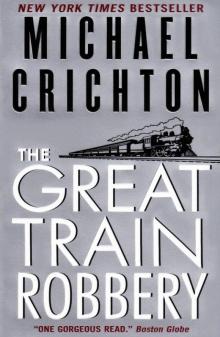 The Great Train Robbery
The Great Train Robbery The Andromeda Strain
The Andromeda Strain The Lost World
The Lost World Congo
Congo Travels
Travels Timeline
Timeline Sphere
Sphere Westworld
Westworld Prey
Prey State Of Fear
State Of Fear Next
Next Disclosure
Disclosure Pirate Latitudes
Pirate Latitudes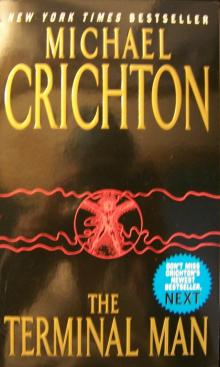 The Terminal Man
The Terminal Man Five Patients
Five Patients Rising Sun
Rising Sun Binary
Binary The Andromeda Evolution
The Andromeda Evolution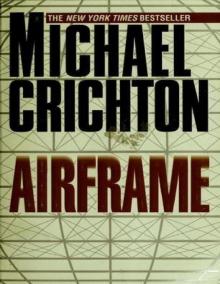 Airframe
Airframe Easy Go
Easy Go Drug of Choice
Drug of Choice Odds On: A Novel
Odds On: A Novel Scratch One
Scratch One Dealing or The Berkeley-to-Boston Forty-Brick Lost-Bag Blues
Dealing or The Berkeley-to-Boston Forty-Brick Lost-Bag Blues Venom Business
Venom Business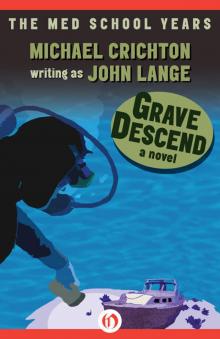 Grave Descend
Grave Descend Gold - Pirate Latitudes
Gold - Pirate Latitudes Binary: A Novel
Binary: A Novel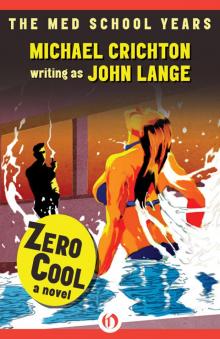 Zero Cool
Zero Cool Delos 1 - Westworld
Delos 1 - Westworld